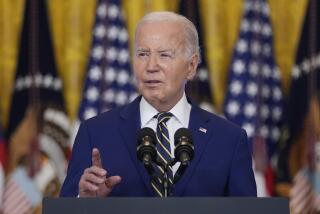PERSPECTIVE ON GAYS IN THE MILITARY : Don’t Compromise, Don’t Capitulate : Just when the judicial outlook is promising for lifting the ban, Barney Frank breaks ranks for politics.
- Share via
Rep. Barney Frank (D-Mass.) surprised his allies when he broke with the move to overturn the Pentagon’s ban on gays and endorsed a modified version of the “don’t ask, don’t tell” plan.
At a time when overturning the ban has more momentum and more highly placed supporters than ever before, Frank is volunteering to throw in the towel. He is saying that lesbian and gay soldiers will make the sacrifice for the sake of compromise. It sounds honorable, the old bit about soldiers sacrificing for their country, but Frank’s justification isn’t persuasive and on a closer look, it probably isn’t too honorable either.
Frank argues that there weren’t enough votes in Congress to get the Pentagon to adopt a wholesale anti-discrimination policy. Maybe if the score was tallied simply by counting votes in Congress, that would be true. But a congressional head count is not the complete picture. Pressure on the Pentagon began in the courts, and if the ban is not overturned by executive order or congressional act, pressure through the legal system will continue to mount.
The “don’t ask, don’t tell” plan compromises a lesbian or gay soldier’s right to say, “I am gay,” which is an issue of free speech. But, Frank says, it’s really not clear what 1st Amendment rights soldiers, gay or straight, have anyway. Admittedly, the courts have ruled in a variety of free-speech cases involving the military that the government may restrict the speech of soldiers more than would be allowable with civilians.
So arguing for a 1st Amendment right of gay soldiers to come out may not be the most strategic route for challenging the ban. That does not undercut the strength of last year’s ruling in the case of Dusty Pruitt, a captain in the Army Reserve living in Long Beach who was discharged in 1986 after her superiors discovered she was a lesbian. She has been fighting her discharge through the legal system, and late last year scored a partial victory with a precedent-setting ruling.
In Pruitt’s case, the Supreme Court upheld a lower court ruling that the military must show that the ban on lesbians and gays has a rational basis in legitimate government interest and not in people’s prejudices. Though the case is on hold until July 15, when a presidential suspension of litigation on the gay ban expires, the ruling has set the judicial standard in similar cases, including the well-publicized case of Navy Petty Officer Keith Meinhold, who was discharged last August after he came out on national television.
After July 15, Pruitt and the Pentagon are likely to head back to court and the Pentagon will have to argue its rational basis for the ban.
How does the Pentagon’s hand look? For months, Sen. Sam Nunn (D-Ga.) and the pro-ban gang have cluttered Capitol Hill with arguments that fall in the prejudice camp. Shower stalls and bunk beds may make for titillating tales in the Senate, but they won’t do double duty as a rational basis for exclusion in the Pruitt case.
So if the Pentagon is on the defensive and the prospects for lifting the ban through the courts look encouraging, why is Frank compromising now? Perhaps he has become too familiar with what one civil-rights attorney characterized as Capitol Hill’s cynical tendency to level all issues as commodities for barter, ignoring the distinction between issues of substance and moral weight and mundane issues of administration or logistics. There is a moral difference between “Should the ban be lifted?” and “How should the lifting of the ban be managed?” The former question is one of civil rights; the latter is one of administration. Compromise isn’t appropriate until the civil rights of lesbian and gay soldiers are secured.
Some have suggested that Frank capitulated to help President Clinton extract himself from his politically messy position between the gay community and the Pentagon. Whatever the back-room maneuvers, Frank’s compromise smacks of a Capitol Hill economy in which civil rights are just another political chip to be bartered.
More to Read
Get the L.A. Times Politics newsletter
Deeply reported insights into legislation, politics and policy from Sacramento, Washington and beyond. In your inbox twice per week.
You may occasionally receive promotional content from the Los Angeles Times.








